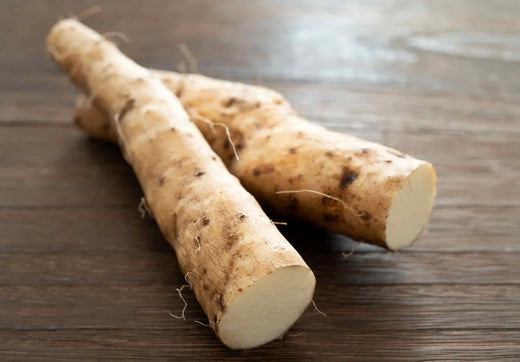
Motherwort: A Mother's Lion-Hearted Love
Written by Rebecca Younger, CH, CDShare
Motherwort (Leonurus cardiaca) is a bold perennial herb hailing from Asia and southeastern Europe, revered for centuries for its powerful role in traditional medicine. Prominent in Traditional Chinese Medicine (TCM), this herb has long been celebrated for addressing everything from occasional anxious feelings to sleep and mood swings, not to mention the all-too-familiar menstrual discomforts. But motherwort doesn't stop there—she's become a go-to remedy in holistic and complementary therapies around the globe, carving her place in both alternative and complementary medicine.
Why do people keep coming back to motherwort? Simple—this herb is packed with a fierce blend of antioxidants and microbial-balancing properties that make her a must-have for any natural wellness regimen. She's a guardian of your vitality, helping fend off oxidative stress and keeping microbial imbalances in check. Add a little motherwort to your daily routine, and you'll feel the difference—physically, emotionally, and energetically.
Even back in 1652, herbalist Nicholas Culpepper was singing her praises. He famously highlighted her top three benefits: supporting the heart, soothing the nervous system, and balancing the reproductive cycle. As he put it, "There is no better herb to drive away melancholy vapors from the heart, to strengthen it and make the mind cheerful," while also tending to the wombs of mothers. Talk about a triple threat!
Motherwort Botanical Information
Motherwort, scientifically known as Leonurus cardiaca L., is native to Central Asia and Europe and has been cultivated since ancient times for its historical applications in treating gynecological and cardiac discomforts. She is now naturalized in much of North America and Europe, growing wild in woodlands, open areas and along roadsides. Motherwort was introduced to North America as a plant to attract bees, and she is still an important pollinator-friendly plant.
This resilient perennial thrives in zones 4-8! With a signature square stem typical of the mint family, she boasts lush dark green leaves that are elegantly three-pointed and arranged in opposite pairs. Come mid-to-late summer, she dazzles with round, light purple blooms that lovingly embrace the stem, creating a stunning display.
Harvesting and Preparation
- Best time to harvest: Motherwort is typically harvested when the plant is in full bloom, usually in mid to late summer. This is when the plant's medicinal properties are at their peak.
- Parts of the plant used: The aerial parts of the plant (leaf, flower, and stem) are used in herbal preparations.
- Basic preparation methods: After harvesting, the aerial parts of motherwort should be dried quickly in a well-ventilated area out of direct sunlight. Once completely dry, the herb can be stored in airtight containers in a cool, dark place for up to a year. Motherwort can be prepared as a tea, tincture, or dried herb for capsules.
Embracing motherwort in your herbal medicine repertoire allows you to experience the nurturing and protective qualities she offers. As you honor the maternal spirit, let motherwort's lion-hearted strength and gentle support bring balance and cheerfulness to your everyday life.
Historical Use and Cultural Significance
Motherwort has a long history of use in supporting the emotional and physical heart. In the Middle Ages, motherwort was reportedly used to calm and soothe the nervous system, as well as to ward off evil spirits. In the nineteenth century, the Eclectic Physicians, as well as Native American tribes such as the Delaware, Micmac, Modheman, and Shinnecock, recognized motherwort's affinity for the female reproductive system.
Today, motherwort is still an important herb in Traditional Chinese Medicine and Western Herbalism. Early in my Chinese Medicine studies a professor was lecturing on the etymology of the Chinese Character "Xin" (Heart), and we discussed how the ancient form of the character looked a lot like a uterus. This is even more interesting knowing that issues of the heart and uterus can oftentimes go hand in hand as both the heart and the uterus have pace maker cells. Motherwort injection is used in Traditional Chinese Medicine for treating obstetrical and gynecological discomforts.
Clinical studies have shown that motherwort injection can ease blood loss during postpartum recovery.
Heart Health and Cardiovascular Support
Motherwort, with its lion-hearted attributes, serves as a gentle but effective ally for heart health. It has historically been used to provide balance and support to the heart, particularly in conditions related to stress and anxiousness, which can have a profound impact on cardiovascular function.
By helping to moderate the impact of stress on the heart, motherwort helps to promote relaxation and emotional well-being. The herb's mildly sedative effect makes it beneficial for those experiencing increased or irregular heart rate or feelings of restlessness linked to stress.
Motherwort is thought to improve blood flow by relaxing the smooth muscles of the heart and arteries, which can help support healthy blood pressure levels. Its antispasmodic properties can also alleviate spasms and cramps, further supporting cardiovascular wellness.
For individuals with a predisposition to anxious feelings affecting heart rhythm, motherwort offers a soothing effect that aids both the body and spirit. While more research is needed to fully understand the extent of its benefits, motherwort remains a cherished remedy among traditional herbalists for nurturing a healthy heart.
Motherwort is particularly recognized for its potential to support healthy blood pressure levels, especially in those experiencing heightened stress and sleep challenges. This underscores its therapeutic potential in addressing various health concerns at once, making it a valuable ally in holistic heart health strategies.
Nervous System Support
Motherwort is renowned for its ability to calm the nervous system and soothe frazzled nerves, acting as a comforting ally reminiscent of a gentle embrace. Taking motherwort is often likened to receiving a nurturing hug, providing a sense of calm and tranquility. By helping to ease the nerves, it enhances our ability to respond to stress in a more balanced manner, offering an uplifted mood and greater well-being.
This heart warming herb promotes relaxation and can help alleviate feelings of anxiousness and sleep issues. It naturally supports the autonomic nervous system, making the transition away from the fight-or-flight response smoother and more seamless. By focusing on the parasympathetic nervous system, the motherwort herb facilitates restorative bodily functions, including digestion, relaxation, and recovery. Regular use can boost stress resilience and ensure emotional stability.
Benefits to the Nervous System:
- Eases anxiousness and promotes overall relaxation
- Supports a balanced response to stress
- Enhances emotional well-being and mood
- Facilitates transition from fight-or-flight to relaxation
- Boosts the body's restorative functions like digestion and recovery
Motherwort stands as a natural alternative to synthetic options, offering consistent support for those experiencing chronic stress and sleep disorders. By helping the body adapt to stressors, it harmonizes with the body's natural processes to restore balance. This natural adaptogen nourishes the soul, fostering a harmonious integration of heart and mind.
Women's Health & Reproductive System Support
Motherwort has been esteemed as a gentle and effective tonic for the female reproductive system for centuries. It plays a vital role in promoting a healthy hormonal balance throughout the various stages of a woman's life, from menstruation to menopause. As a uterine tonic, it helps regulate the menstrual cycle, particularly when influenced by stress or tension, and strengthens and nourishes the uterus.
Postpartum mothers can find comfort in motherwort's calming properties, which help soothe postpartum discomforts and emotional upheavals. Its ability to ease tension and relax spasming muscles makes it particularly beneficial for women experiencing menstrual cramps. By strengthening the uterine muscles, Motherwort not only alleviates current discomfort but can also help in reducing the frequency and severity of cramps over time.
Motherwort goes beyond just tackling individual symptoms; it's all about embracing the holistic well-being of women. By cultivating a vibe of peace and balance, it nurtures both body and spirit, empowering women to tap into their innate strength and flow through all stages of life.
Common Uses and Applications
Motherwort is typically consumed as a tea, tincture, or in capsule form, each offering unique benefits and methods of preparation. When taken as a tea, it allows for the soothing ritual of brewing and sipping, which can enhance its calming effects on both the mind and body.
A tincture, on the other hand, offers a concentrated form that can be easily incorporated into daily routines, providing convenience and efficacy through its potent extraction.
Capsules offer another form of accessibility, allowing individuals to experience the herb's benefits without the flavor that some may find challenging.
The Advantage of Liquid Tinctures
When it comes to harnessing the full benefits of motherwort, liquid tinctures offer several advantages over pills or teas. Tinctures are alcohol-based extracts that provide a concentrated form of the herb's active compounds, allowing for faster absorption and more immediate effects. Unlike pills, which must be broken down by the digestive system, tinctures enter the bloodstream more quickly, providing quicker relief for respiratory or skin problems and digestive discomfort.
Moreover, tinctures offer a level of flexibility that pills, and teas do not. They can be easily mixed into hot water or, tea, or even honey for a more palatable experience. This makes them ideal for those who need fast-acting relief or want to avoid the bitter taste that sometimes accompanies herbal teas. For individuals who have difficulty swallowing pills or prefer not to consume large volumes of liquid, tinctures are an efficient and easy-to-dose option.
At WishGarden, motherwort shines in a variety of women's blends, including... Postpartum Emotional Baby Blues, AfterEase For After Birth Contractions, P.M.S. Emotional Mood Support, Cycle Changes Peri/Menopause, ReBalance After Birth Hormonal, Cycle Harmony Hormone Support, Deep Stress, Emotional Ally, and Cycle Vitality 1.
Traditional Chinese Medicine and Motherwort
In Traditional Chinese Medicine (TCM), motherwort is known as "yi mu cao" and is highly regarded for its ability to regulate menstrual disturbances and postpartum bleeding. The herb's versatility extends to alleviating menopausal symptoms such as hot flashes and night sweats.
Motherwort is often used in combination with other herbs to enhance its therapeutic effects. For example, it is a key ingredient in the herbal formula zhi bai kuncao tang, which is used to support women's health. Additionally, motherwort injections have been studied for their effectiveness in reducing uterine bleeding in a dose-dependent manner, showcasing its potent medicinal properties.
Motherwort's long-standing role in TCM showcases its lasting value in boosting health and well-being. Whether flying solo or teamed up with other herbs, it remains a go-to for trusted, natural botanical care.
Precautions and Side Effects
While motherwort is generally considered safe for most people, it is important to be aware of potential side effects and interactions. Some individuals may experience dizziness or an upset stomach when using the herb. Additionally, motherwort can interact with sedative medications.
Pregnant women should avoid using motherwort, as it may stimulate uterine contractions and increase the risk of miscarriage. As with any herbal remedy, it is crucial to consult with a healthcare provider before incorporating motherwort into your routine, especially if you are taking other medications or have underlying health conditions.
It is also worth noting that there is not enough reliable information to determine an appropriate dose of motherwort. Natural products can vary in potency, and what works for one person may not be suitable for another. Always start with a low dose and monitor your body's response, adjusting as needed under the guidance of a healthcare professional.
Motherwort Q&A
Is motherwort safe to use during pregnancy?
While motherwort has been traditionally used to support women's health, it's generally not recommended during pregnancy as it can stimulate uterine contractions. Always consult with a healthcare provider before using any herbs during pregnancy.
Can men use motherwort, or is it only for women?
Despite its name and traditional use for women's health, motherwort can be beneficial for everyone. Its calming properties and support for heart health can be useful for all genders.
How does motherwort affect the heart?
Motherwort is known to have a calming effect on the heart. It may help support healthy blood pressure and heart rhythm when used over time. However, it should not replace prescribed heart medications without consulting a doctor.
Are there any side effects of using motherwort?
While generally considered safe, motherwort can cause side effects in some people, including dizziness, drowsiness, or upset stomach. It may also interact with certain medications, particularly those for heart conditions or blood thinners. Always consult with a healthcare provider before starting any new herbal regimen.
How is motherwort typically consumed?
Motherwort can be consumed in various forms, including teas, tinctures, and capsules. The dried herb can be used to make tea, while tinctures offer a more concentrated form and tend to be more easily absorbed. Some people also use motherwort extracts as part of herbal blends.
Can motherwort help with nervous system and stress?
Yes, motherwort is known for its calming properties. It's considered a nervine, which means it can help soothe the nervous system. Many people use it to help manage stress and anxiousness, though it's important to note that it should not replace professional mental health care.
Herbal Comparison
Motherwort, lemon balm, and passionflower are frequently grouped together due to their potent calming effects, yet each herb holds unique properties that make it suitable for different uses.
Lemon Balm
Lemon Balm is often celebrated for its delightful lemony scent and flavor, which adds a pleasant dimension to its use in teas and culinary dishes. It is primarily recognized for its ability to alleviate stress and sleeplessness just like the other herbs. However, it stands out due to its immune supportive properties, often used to help manage symptoms of cold sores and improve cognitive function. Lemon balm's mild sedative effects make it an excellent choice for those seeking subtle aid in stress management without pronounced drowsiness. It's also gentle enough for children, and helps relieve "crankiness."
Passionflower
Passionflower, on the other hand, is revered for its potent sedative effects, making it highly effective in managing restlessness and mind chatter. Unlike motherwort and lemon balm, it is particularly noted for its ability to alleviate sleep disturbances by enhancing GABA levels in the brain, thus promoting relaxation and a deeper sleep. While it doesn't directly impact the heart or reproductive system as motherwort does, its role in promoting sleep sets it apart as a vital herb for those with more pronounced sleep issues.
While these herbs share common ground in their calming effects, understanding their unique benefits can guide individuals in choosing the best herbal aid to align with their specific health needs and lifestyle preferences.
Motherwort: A Mother’s Lion-Hearted Love
Motherwort is a true multitasker, especially when it comes to women’s health. But don’t let her name limit her—this herb’s soothing, heart-supporting magic makes her a great fit for anyone. Whether you're looking to ease your mind, balance your emotions, or show your heart some extra love, motherwort steps up like the reliable herbal ally she is.
Her versatile benefits and easy-to-use forms—tea, tincture, or capsule—make motherwort a natural fit in anyone’s wellness routine. If you’re on the hunt for a little extra support, this herb is a no-brainer.
So, next time you need to hit reset or you're craving some self-care, brew up some motherwort tea or sneak her into your day. It’s like giving yourself a calming, herbal boost—exactly what you need to feel balanced, grounded, and ready to take on whatever comes next.
Rebecca Younger is passionate about herbs and women's health. She aspires to plant seeds of inspiration within her community about plant medicine and healthier ways of life. She studied Herbal Medicine at Herbalism Roots in Denver and is a certified Doula through the Matrona Foundation. She is the Brand Communications Specialist at WishGarden Herbs.
For educational purposes only. This information has not been evaluated by the Food and Drug Administration. This information is not intended to diagnose, treat, cure, or prevent any disease, or to sell any product.




















